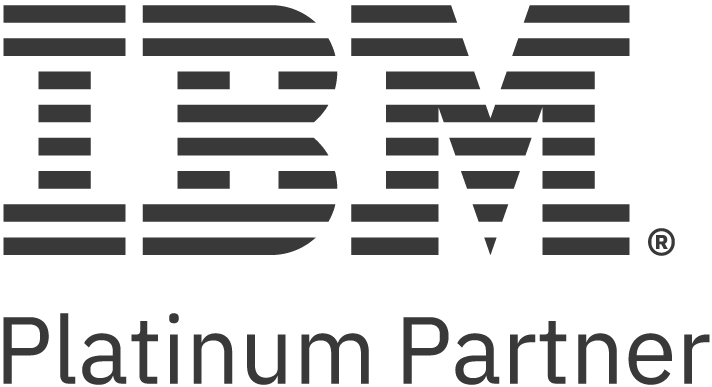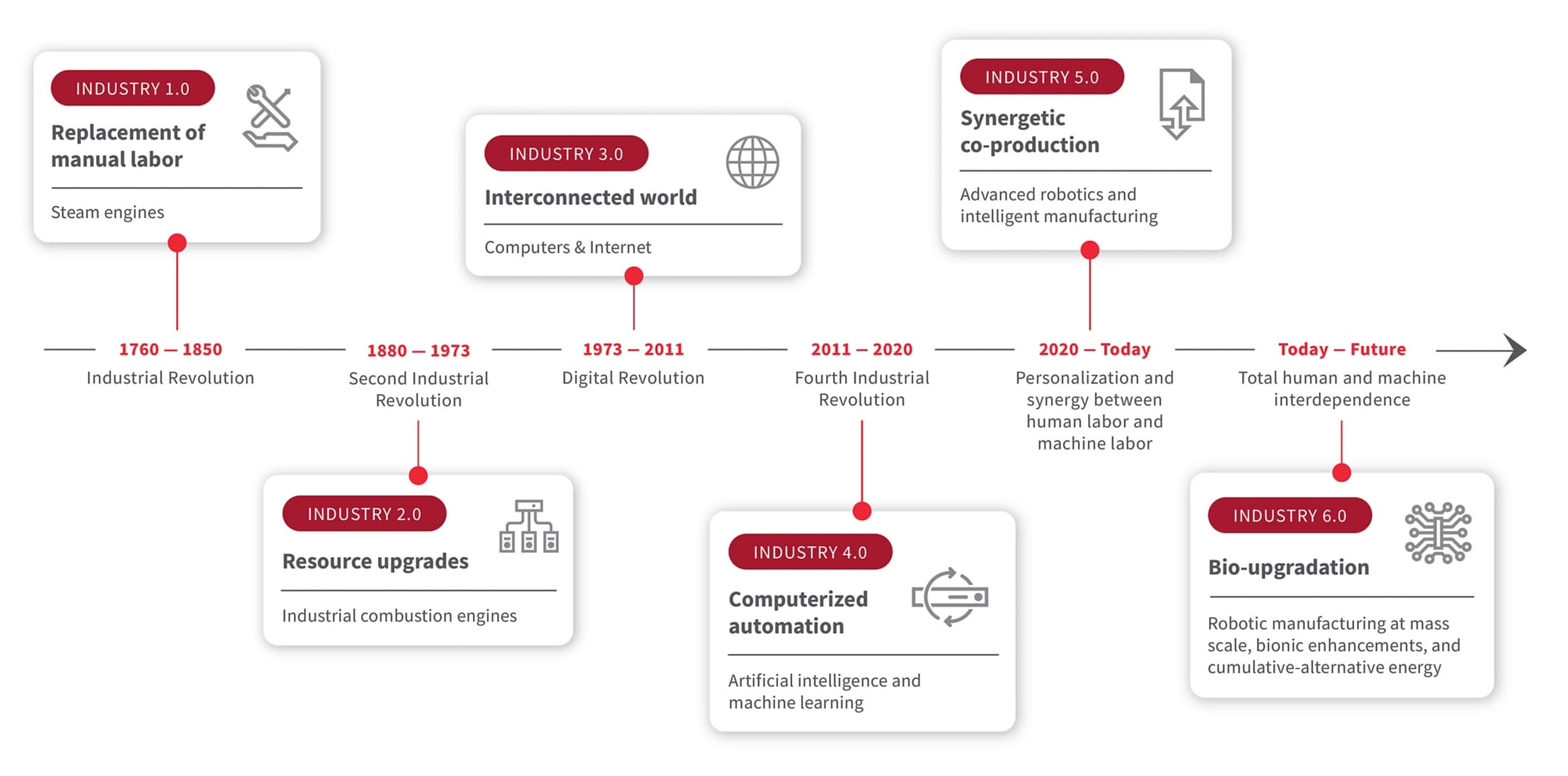August 23, 2024
5 Essentials for Manufacturers to Harness Industry 4.0
The future of manufacturing is set to be transformed by 4IR technologies.
Advancements in smart technologies like the Internet of Things (IoT), artificial intelligence (AI), cloud computing and digital twins are driving the Fourth Industrial Revolution (also known as Industry 4.0 or 4IR) to full realization. Rockwell Automation's annual State of Smart Manufacturing report highlights that 95% of manufacturers are already leveraging smart technologies.
From improving operational efficiency to staying competitive in an increasingly digital marketplace, the necessity for manufacturers to embrace 4IR technologies is clearer than ever. And yet, World Economic Forum reports that 70% of Industry 4.0 pilots are actually failing. How do manufacturing organizations embrace and implement Industry 4.0 effectively? Here are five key factors for success.
What Is Industry 4.0?
Industry 4.0 refers to the ongoing evolution and transformation of traditional manufacturing and industrial practices through the integration of advanced technologies. It essentially aims to create "smart factories" where machines are interconnected and can communicate with each other, enabling highly automated and efficient production processes. This revolution enhances productivity, flexibility and customization while reducing costs and environmental impact.
4IR technologies are a suite of modern tools and processes that facilitate the digital transformation of manufacturing. They enable real-time decision-making, increase productivity, and enhance flexibility and agility.
Here are some of the most impactful 4IR technologies transforming the manufacturing sector:
- Internet of Things (IoT) and Industrial Internet of Things (IIoT): These networks of interconnected devices provide real-time data and insights.
- Big data analytics: This involves processing large volumes of data to extract actionable insights.
- Artificial intelligence (AI) and machine learning (ML): These technologies improve decision-making and automate complex tasks.
- Cyber-physical systems (CPS): These integrate physical processes with digital control systems.
- Additive manufacturing (3D Printing): This technology allows for rapid prototyping and on-demand production.
- Digital twins: These are virtual replicas of physical assets that allow for real-time monitoring and simulation.
Industry 4.0 Success: The 5 Ss
1. Scaled deployment
Successfully deploying and scaling 4IR technologies is critical to improving overall equipment effectiveness (OEE) and operations. A recent Bain and Company report indicates that manufacturers who effectively embrace Industry 4.0 can increase their productivity by 30-50%.
Yet, manufacturers face many challenges in deploying 4IR technologies at scale. Upfront investment in new equipment, software and infrastructure can be costly. Integrating 4IR technologies with legacy systems is also often complicated, and the change management efforts necessary for effective implementation and adoption don’t come easy.
Addressing these barriers requires strategic planning, investment in training and infrastructure, and a commitment to continuous improvement. Pilot programs, digital twinning and phased rollouts are recommended. A phased approach not only helps with scaling a technology rollout but may also help spread out costs.
For example, digital twins provide a virtual representation of physical assets, systems or processes. This virtual counterpart can be used for simulation, monitoring and optimization, facilitating a smoother and more efficient transition to Industry 4.0.
2. Synergy
Becoming fully Industry 4.0-capable depends heavily on the dynamic between your IT and operational technology (OT) teams. Getting IT and OT on the same page is critical to ensuring seamless integration of technology solutions, improved decision-making, optimized resources and driving innovation. By combining IT's data management and cybersecurity expertise with OT's real-time data collection and practical insights, organizations can achieve comprehensive data strategies, predictive maintenance, agile development and strategic alignment, ultimately leading to increased efficiency, security and competitive advantage.
Additionally, engaging employees in the digital transformation journey is vital for securing their support and commitment. By involving staff in the process, businesses can harness their insights and experiences, leading to more effective implementation of technologies and change management. Ultimately, the convergence of IT and OT paired with proactive training and employee participation creates the synergy necessary for Industry 4.0 success.
3. Staffing
Manufacturers face several talent and skill challenges in the era of Industry 4.0, where advanced technologies like IoT, AI, big data and automation are reshaping the industry. These challenges include:
- Significant skill gaps
- Rapid technological change
- A lack of comprehensive training programs
- High demands for specialized talent
Addressing these issues requires strategic investment in continuous training and development, fostering a culture of innovation and adaptability, and bridging the gap between existing skills and new technological demands to build a capable and resilient workforce.
Partnering with an experienced technology integrator can play a pivotal role in helping organizations bridge the talent and skills gap. Experts offer access to skilled IT professionals who possess experience with Industry 4.0 technologies. They can help you devise training programs tailored to your organization’s needs and provide consulting and advisory services to help you develop a comprehensive Industry 4.0 strategy.
4. Security
Embracing Industry 4.0 means more connected devices and applications, which inherently expands the potential attack surface for cyber threats. A single compromised device can lead to widespread security breaches, making it essential to prioritize security to safeguard both data and functionality.
Effective Industry 4.0 security relies on a multifaceted approach that addresses the unique challenges of increased connectivity, data sharing and advanced technologies. A comprehensive security strategy features detailed security policies and incident response plans, including network segmentation and robust firewalls to protect against unauthorized access, IIoT device and endpoint protection, real-time monitoring, regular patch management and compliance with regulations.
Partnering with 4IR technology and security experts can help manufacturers create a secure environment that protects against cyber threats and supports the safe deployment of Industry 4.0 technologies.
5. Sustainability
A new climate disclosure requirement mandated by the Securities and Exchange Commission (SEC) will require manufacturers to report emissions and climate-related risks that are material to their business. In a world where rising environmental consciousness and responsibility are setting the standard for operations across industries, manufacturers especially must adapt and evolve to stay in the game. As governments and regulatory bodies worldwide impose stricter environmental regulations, and consumers increasingly demand products that are sustainably produced, adopting sustainable practices becomes essential.
4IR technologies inherently enable resource optimization, waste reduction and energy efficiency — reducing manufacturing costs and environmental impact while maximizing output. But the role of Industry 4.0 in addressing the triple bottom line — people, planet, profit — and connecting people and technology is also considerable, especially amidst AI and job displacement concerns. Industry 4.0 actually aims at enhancing human-machine collaboration and improving work environments to maximize employee satisfaction as well as productivity.
Lastly, 38% of manufacturers still struggle with supply chain issues perpetuating since before the pandemic. A 2024 manufacturing outlook published by AlphaSense highlights that “…with geopolitical tensions and energy shortages, manufacturers have increasingly been looking into establishing domestic supply chains, so as to increase resiliency and decrease dependence on other nations.”
From better tracking and transparency with blockchain technology, to real-time data and analytics that enable just-in-time production, Industry 4.0 offers the supply chain continuity and peace of mind manufacturers are looking for while contributing to business longevity.
Preparing for the Future of Manufacturing With CDW
The future of manufacturing is set to be transformed by 4IR technologies. These innovations promise to revolutionize every aspect of manufacturing.
From digital transformation to process automation, CDW offers full-stack expertise, expert guidance, customized solutions and ongoing support to help manufacturers harness the power of 4IR technologies. We even built an Emerging Tech Transformation workshop based specifically around challenges and pilot failures to help organizations adopt emerging technologies. CDW provides tailored solutions to enhance productivity, efficiency and security while ensuring success in Industry 4.0.




